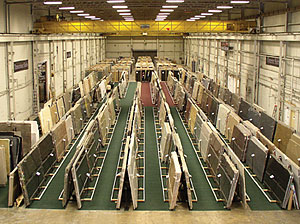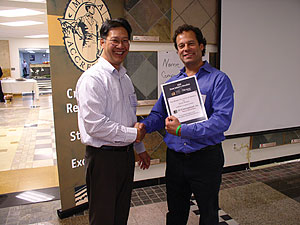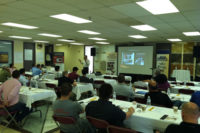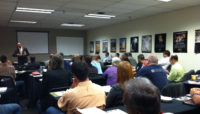
Taking place in locales across the U.S., the Marble Institute of America/Stone World “Stone Industry Education” program drew hundreds of fabricators, shop managers and business owners over the course of 2010, and it offered a diverse lineup of topics.
In addition to providing information on fabricating challenges, the program featured sessions on slab handling and other safety hazards, installation, cladding, preparing for OSHA inspections, equipment evaluation and a range of business topics. Some of these business sessions included understanding fabrication costs, pricing strategies, marketing, diversifying a fabrication shop and more.
These sessions took place in high-end showroom/warehouse facilities across the U.S., and they also offered an opportunity for attendees to network with other professionals and to peruse the inventory of some of the nation’s leading stone distributors.

The lineup for 2011 has already been announced, and it includes:
• February 16: Anaheim, CA
• March 30: Atlanta, GA
• April 14: Houston, TX
• May 19: Denver, CO
• June 16: Boston, MA
• June 23: Toronto, ON (Canada)
• July 28: Seattle, WA
• September 14: Baltimore/Washington, DC
• November 2: Phoenix, AZ
To sign up for any of these seminars, please visit www.stoneworld.com/miaeducation
Program Summary: Edison, NJ
One of the final Marble Institute of America/Stone World programs of 2010 took place at MS International, Inc.’s facility in Edison, NJ. The education was led by Tony Malisani of Malisani, Inc. in Great Falls, MT, a third-generation stone shop. Malisani has extensive knowledge about business management in the stone industry - with an emphasis on the growth opportunities for a small business. His firm is one of the first companies in the nation to receive the “Natural Stone Accredited Fabricator” credential from the Marble Institute of America (MIA). Malisani also serves on the MIA Accreditation Appeals Committee. Summaries of the sessions “Diversifying Your Business” and “Understanding Countertop Fabrication Costs” are on pages 80 and 81 of this issue.

Diversifying Your Business
In a session geared towards shop owners and managers, Tony Malisani presented “Diversifying Your Business” during the program in Edison, NJ.
In assessing how to diversify a business, Malisani said it is important to understand the possible goals for diversification, which include:
• Selling more to current customers
• Attracting new customers (different markets)
• Protection against competitors
• Protection against downturns
• Build stronger brand positioning
Malisani also spoke about what makes for a proper diversification plan. Specifically, he said it should:
• Utilize the resources you already have
• Use the skills you already know
• Supply an unfilled demand
• Expand your customer base
Meanwhile, a diversification plan should not:
• Add products or services that don’t match your area of expertise
• Start a new venture that doesn’t fit your customers’ perception of your brand identity, such as adding inexpensive cabinetry to a high-end stone shop
• Disrupt your normal business activity or relationships

As an example of this, Malisani spoke about some fabricators that got into the cabinetry sector because they felt they were working the cabinets anyhow. Some of these fabricators ultimately upset the cabinet shops that were part of their existing client base. “And other example is expanding into tile when you already have customers who are in that market,” he said.
Malisani then listed five business characteristics - price, service, product, experience and access - and said that fabricators looking to diversify should pick the one attribute where they excel and another where they are above average, and this will help determine which direction to take.
Options for diversification include:
• Specialize - expand your efforts in a single area, such as a “fabrication specialist” using your machinery for wood and glass as well as stone
• Generalize - such as expanding product options in “residential stonework” or “commercial stonework”
• Localize - make products that are currently being resourced somewhere else, such as fireplace surrounds, and promote the shorter lead times and smaller carbon footprint of making it locally
The options can vary from shop to shop, based on its resources and inventory.
In terms of product expansion, Malisani spoke about the value of promoting items using scraps and end pieces, such as corbels, tabletops and stepping stones. He also discussed carrying related products such as sealers, cleaners and other maintenance products.
Additional service options could include tear out and clean-up, limited plumbing, minor electrical, minor restoration and product delivery.
“Your reputation can add value to a new product or service,” he said. “Leverage that reputation into new markets. Out your brand in front of new customers. [When first diversifying,] don’t worry about price as much as expanding your customer base.”

Understanding Countertop Fabrication Costs
Among the topics that Tony Malisani addressed, a session on “Understanding Countertop Fabrication Costs” was of interest.
“You need to be aware of what others are promoting,” Malisani said as he displayed an advertisement that was published in the local newspaper that promised a five-year stain guarantee, a sink, 10% off and an offer for six-month financing. “Some of those don’t mean anything. When you see these ads, you have to take the time to break it apart and convey to customers what you can really offer.”
In assessing a fabrication shop’s costs, Malisani stressed the need to determine which are the fixed costs (business expenses that do not vary according to the volume of production) and which are the variable costs (that change directly in accordance with the level of production).
Malisani went on to summarize the various pricing strategies that are used in the marketplace, and they included:
• Square-foot/piece pricing - safe, but not effective for differentiating a business and may not be good for overall profit margin
• Good-better-best pricing - varied pricing for different market segments - retail, kitchen/bath dealer, designer, contractor/developer
• Bundle pricing - encourages the use of product in quantity by offering a discount for volume purchasing and allows for profit maximization
• De-bundled square-foot pricing - encourages customers to upgrade and choose options of their choice, with upselling to help revenue maximization
• Premium/custom pricing - when selling is unique and of very high quality; has greater administrative costs, but works well with profit maximization
• Penetration pricing - for use in new and different markets

“Direct costs” cited by Malisani include costs such as freight, materials, power, abrasives, tools, commissions, adhesives, overtime and labor.
Meanwhile, “indirect costs” would include administrative staff, insurance, publicity, taxes, vacation, maintenance, safety programs and retirement.
In order to gauge the costs of a fabrication business, Malisani explained the use of tools such as software, time sheets, job cost sheets and specific accounting practices. He then showed examples of typical material cost component sheets, job reports and job cost sheets. He also showed an example of a detailing pricing sheet that itemizes prices for work such as cut-outs, edgework, radius corners, bump-outs, faucet holes, lamination, seams, etc. “If they don’t like the price, you can work with them to see where it can be adjusted,” Malisani said.
In conclusion, Malisani stressed that it important for fabricators to sell themselves on service rather than price. “While Home Depot and Lowe’s sell countertops as a SKU, you can give them an experience,” he said. “Don’t compete on price. That will always be a loser.”


